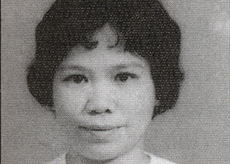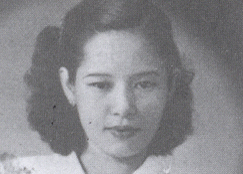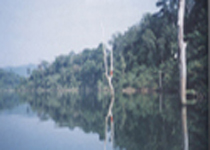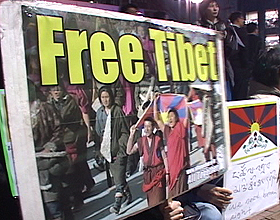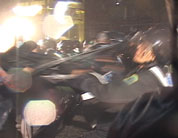all text articles
Home > list > international
Life As a Barefoot Doctor
[Life as the River Flows](5) Suria (Born in 1951, Thailand)
Agnes Khoo
 |
▲ Suria |
"They were really good to us (The CPM and their guerrillas). They explained many things to us. They taught us the history of Malaya, why they wanted to fight this war. They assured us that they were not interested in attacking Thailand. They just wanted to liberate Malaya. My father knew that my first husband and I were going to join the guerrillas. He let me go because he knew the enemy was coming for us."
Young and Poor
My family was always poor (begins to cry...) my father hardly had anything, no property. We were seven brothers and sisters altogether. I am the youngest. My brothers left home to look for work and I stayed home with my father. I only had one year of elementary school because my father could not pay my school fees. We lived near the border of Thailand and Malaya. I learnt how to do housework from a very young age. I also helped my father clear the forest to plant rice. Whatever my father asked me to do, I would do. We also grew rubber trees. My father often beat my mother up. So she fell ill very often because he beat her up so badly. But we had no money to bring her to the doctor. That was how she died. I lost my mother when I was 7. My father was not good to me too. I don’t know why I was always crying. He would beat me so badly that I used to have bruises all over my body. My sister would try to rescue me by snatching me away from him. In contrast, my mother was always loving and gentle with us. I really loved her.
Marriage as a young girl
I got married at 14 and my husband was 25 years old then. Life changed after marriage. Although my father had stopped beating me, it was my husband who started to beat me. It was just as bad. I had a baby soon after our my marriage but I was too young to know how to take care of the baby properly, there was no one around to teach me, so the child died within a year. By then, I have learnt to retaliate whenever my husband kicked me. I could be fierce too. I did not give in easily, I would fight him. We would fight until ‘bin lin ban lang’(sound of falling pots and pans), I did not care! There were times he threatened to kill me. I told him: "If you kill me, you will also die. You bully a woman, a woman on her own." I finally asked him for a divorce but he refused. He said: "It is not that I don’t love you. I love you." Then I asked him, "If you love me, why do you beat me? It should not be this way. We should talk about things that are not right between us. "Life was very difficult, we were very poor.
Joining the CPM
I only met the communists after I got married. They were active in my husband’s village. I was 19 when I met them and I did many things for them. In our village, there were about 40 people who helped the communists, including my husband. We knew of course that it was a dangerous thing to do but we were moved by their kindness. I never thought I would join the guerrillas because the Thai government were arresting anyone suspected of helping the communists. There were informants in our village. At that time, the guerrillas were very dependent on the villagers to buy things for them. Because of the increasing risks of arrests, they asked us to join them in the jungle. They were going to move to a different place. We considered our options carefully. We did not know them well because we are Thais and they are the CPM. I asked them, "We are Thai people, if we join you, what will happen to us after Malaya is liberated? " They said we could choose to stay in Thailand or go to Malaya after its liberation. That was how we joined them, we were so poor, at least with them, we had food and clothing, and they were so good and kind to us. They explained many things to us. They taught us history of Malaya, why they wanted to fight this war. They assured us that they were not interested in fighting Thailand. During those times, if we were caught by the Thai government for helping the guerrillas, we would have been killed. They would have put us in an oil drum and burnt us alive. The enemy was cruel and hard, they punished anyone suspected to be a communist or a sympathizer the same way they did to ordinary robbers.
Problems with my first husband
14 of us from my village left for the jungle together. My husband and I went together but he was still not good to me. He changed after being in the guerrillas for one or two months. His ideas changed because it was a very hard life. As a woman, life in the army was no worse than life at home since we have to work equally hard no matter where we are. But for my husband, army life was different. He did not have to do housework at home, so he could not cope with the hardships in the army at all. I could carry at least 30 kg of food on my back and he could not even manage 10! He would leave his load halfway and I have to carry it for him. Finally, one night he told me he planned to leave the army and he insisted that I come with him. I refused; I told him that I have already made up my mind to stay, no matter how hard life was going to be. I would rather die in the mountains than to follow him. He even threatened to kill me if I refused to go with him. I was sleepless for a few nights it did not feel right. Finally, I told our camp leader about it. One night, a big storm came and a huge tree fell on him. He was killed instantly. As a result, I was alone and for the first time in my life, I felt happy. I was finally free.
Learning to Read
I was taught how to read and write in Malay and Chinese in the army. My present husband was my teacher. At that time, I could not even hold a pen properly. He eld my hand everyday and taught me how to write my ABCs. I studied everyday until I become literate. I woke up at 5 in the morning to tudy and my husband would also rise early to teach me. He would listen to me and correct my mistakes. I like studying because I did not have a chance to do it before. At least in the army, we did not need money to be educated. I wanted to work hard so that one day when Malaya is liberated, my education would come in useful. I can read newspapers and write a little nowadays. After we left the mountains in 1989, the Thai government sent us teachers to teach us Thai language.
Raising Children
My life in the army was good even though it was tough. I was a guerrilla for 20 years! I had a daughter with my present husband when we were still inside the jungle but we had to give her away because of our situation. We did not look for her after we left the jungle. We have a son and he is 11 years old now. We would have had a 3rd child but I lost it while working in our rubber holding. I fell and had a miscarriage. After that, no more. My father died while I was still in the jungle, my comrade did not tell me, they were worried that I would feel bad. It was my sister who informed me after we have left the mountains. She said my father really missed me. Life in the outside world would have been tougher, had I not joined the army because we were so poor and there was no relative to help us. We were totally on our own, whereas in the army, we helped one another. This does not mean life in the wild forests and mountains was easy either. Our main worry was how to evade enemy’s ambushes and fight whenever we had to retreat to a safe place.
Risking Death Laying Mines
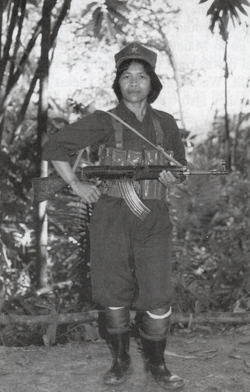 |
▲ Suria in the army |
Other times, trees would fall and change the landscape, so we needed to remember the locations very well. Or else the consequence could be fatal. There were once or twice that I nearly stepped on landmines that I have laid myself. If not for my colleagues who warned me in time, I would be long gone. The only way to diffuse a mine is to remove the current. Whenever we head explosions, we had to return to the area to check. We also checked our landmines regularly, to see if they were still working or if some had already exploded. One day, a Malay comrade was dispatched to check the mines while I was assigned elsewhere for some other kind of work. He went on his own and as he poked around the area with a stick, suddenly one mine exploded and he lost an eye. We did not have a mine detector, so we had only ourselves and our memory to rely on. Mistakes could also happen at the point of connecting the current after the mines were laid, which could cause instant explosion. So after we had connected the current, we learnt to instantaneously jump away and hide behind a tree. Over the years, accidents had occurred but because we had laid so many mines, we have also become very experienced.
Life As a Barefoot Doctor
We also did medical work in the army. My present husband is also a doctor. He taught me medical skills. Even though we are no longer in the guerrilla now, I still do medical work for my comrades here in the village. I know how to give injections and acupuncture. I know how to use Chinese herbs collected from the heart of the forests. I also learnt many valuable things from the ‘big’ (highly qualified) doctors who had studied in China. They would give us lessons that lasted between one week to a month. We could study about medicine one or two days per week. We memorised the names of different medicines and herbs. In Malay, we are called Doktor Kaki Ayam (laughs)It means a doctor who walks all over the village to treat the sick Like a chicken that walks all over the place. The Chinese called us Barefoot Doctor. We have a reference book when we do acupuncture which we published ourselves in the army. It was written in both Chinese and Malay, my husband was the one who wrote it.
Fighting the Enemy
We were involved in a few skirmishes with the Thai soldiers. They came right into the heart of the jungle to attack us. Out of self-defence, we ambushed them, usually after they were already halfway to our base. Once the guns started firing, all fear was lost. "Fight!" These exchanges usually did not last long because we would retreat as soon as we could. Usually the government soldiers were more afraid of the landmines. But the enemy also laid their own land mines, which had killed many of our comrades too. We never attacked them first, it’s always them who provoked us first. We fought as a group of 7 or 8 members together, led by very experienced old comrades. But the enemy would come in groups of over one hundred. So we used clever guerrillas tactics of small groups and scattered fire to overcome them. We had to play hide-and-seek with them. There were differences among the Thai soldiers too, those in black uniforms were rough and ruthless and those in green uniforms were usually Malays like us. The latter would inform us before they entered the forest and told us when they would leave because they were scared of us. They communicated with us through our underground members in the Malay community. We would not have survived if not for these underground connections. Sometimes, the enemy would come very close to us without discovering us. We would cover our traces well and keep absolutely silent whenever they were nearby.
After my first battle, my confidence increased because I had fired my guns at the enemy and nothing had happened to me, so I was no longer scared. I was never wounded because we practised and drilled everyday. I was a member of the frontline troop (combat troop), that means we were always the first to fight whenever the enemy attacked us. And I was the only woman in my group too. (laughs) It was not difficult to fight alongside male comrades except when it rained. We would be soaked through the bones but we could not move away from our ambush position for many hours. That was tough. We would return with high fevers sometimes. The enemy knew that, so they liked to attack us during the rainy season, also during festive seasons like the Chinese or Malay new year.
Equal Treatment between men and women
Men and women are treated the same in the army. Physically, men maybe stronger but there are also women comrades who are stronger than men too. Some of us women were more capable then the men in the army. Maybe it has to do with our spirit and endurance. We can take more stress and strains. We knew how to do everything. Men are spoiled; they could not do this and that. In the army, we do not look down on the women. Some women did more than men, we cook, fight, hunt, plant vegetables, take care of animals, saw wood – women can do all that. Since we have left the mountains, it is still the women who are doing most of the work. Look who’s tapping the rubber nowadays? Mostly women. Many of our men are too old now. The CPM women are not afraid of danger or working alone at night in our rubber holdings. We tap rubber from 11 pm to midnight, it is better to do it at night when the latex flows much more and the morning is too hot. The people outside our community dared not do anything bad to us because they know who we were. The Malays outside of our community used to say: "Look! These CPM women, they are so capable!"So you see, we are different, the way we live is different.
 |
▲ Suria with her son |
When we gave birth in the army, the Party provided us with post-natal care we were given more allowances to buy milk and better food to help us recover. Usually the mothers could recover fully in just one week and after a month, they were already carrying loads! But due to the safety of the collective, our children cannot stay with us in the jungle, they had to be sent away immediately after birth. Giving birth in the jungle was not difficult since we had qualified doctors. I have also delivered babies for my comrades before. As women in the army, we have been through a lot and we have proven ourselves in battles.
Identity and Belonging
When we first left the mountains, we first lived in a Malay village where I was selling groceries. Since my husband is Chinese, he does not pray at the mosque every Friday and the villagers disapproved of this. I now consider myself half Malay and half Chinese since I do not join my people to the mosque either. I considered my husband’s situation and decided to move with him to our present village. We feel more comfortable here because there are both Chinese and Malays here. Since we were from the army, our thinking is very different from the ordinary Malay community. We were educated in the ideas of Marx; his teachings are very different from Islam. But the local Malays are very concerned about religion, they are much stricter about praying to God. Whereas I am not so strict about fulfilling Malay customs and rituals. That is why my comrades also considered me half Chinese and half Malay.
Life as a Thai/Malay CPM member
After I joined the army I learnt that there were also Malays in Malaya like in Thailand. They told me that the part of Thailand where I was born originally belonged to Malaya. Even though I am not from Malaya, I joined the CPM for the common, universal value of freedom. My loyalty to the Party has not changed even till this day. I am still part of the party, whatever I do; I am guided by the party. We cannot just ignore our past.
Although Thailand is a free country and I can go and stay wherever I want, I prefer to stay here because it is comfortable here. No worries, no problem. The outside world is far more complicated. As a Thai, I know the realities of the outside world well. It is not difficult to adjust to our new life after leaving the mountains, even though we have to stand on our two feet and cannot depend on the party to feed and clothe us now. Thailand has also changed a lot in the last 20 years; there are many places that I cannot recognise today. In just over 20 years, so many things have changed. Even the way to my home, I can no longer remember ....
Of course I think of my home and family. I left home with only my two bare hands. When I came out of the army in 1989, I had wanted to fight for my share of our inheritance but my husband persuaded me not to. He said we could look after ourselves. My brother who now lives in Pattani is rather wealthy but I do not go looking for them and neither do they. What is the point of going home? I have nothing there. Even though I have sisters, they are not concerned about me. They hardly asked about me or visit me here. This is my home now, I have everything here and my comrades are good to me. I still have to work very hard because we have a child to support but we help one another in the village. If anyone is in trouble or needs to see a doctor or needs money, people will help. Now I tap rubber for our livelihood. We have our own land and my husband takes care of the deer we keep in our village. I am now saving money so that in the future, we could acquire more land. The land allotted to us where we grow rubber trees is too steep and difficult to reach. So these days, I only concentrated on tapping the trees on the lower ground. We do not hire any help to tap rubber, I do it all by myself. Sometimes, when there is not enough money, I also work for other people. There is a lot of work to do everyday but we are OK now.
Real editing time : March 3, 2008
Registration : March 3, 2008
Registration : March 3, 2008
trackback URL http://www.newscham.net/news/trackback.php?board=news_E&nid=46614 [copyinClipboard]

